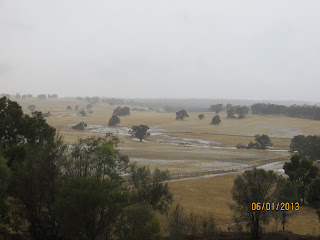The water issue. Possible pollution of surface
water – leachate leaking into creek systems, draining into the Avon river. Then
there is the possible pollution of ground water supplies. The area around
“Allawuna” is known to have Palaeolithic channels, These are underground
streams that come to the surface in various places in the form of springs and
soaks. While it is known where the soaks and springs are, the precise locations
of these channels are not known, as nobody has ever pinpointed them. What is
known is that the system drains into the Helena River, which in turn drains
into the Mundaring weir. Leachate leaking into the ground water can not be
recovered and could lead to possible pollution of these channels. In the area
to the south/southeast of the proposed landfill, a huge amount a rehabilitation
work has taken place in the last ten year. Water courses have been fenced off
and tens of thousands of trees have been replanted. All this could be jeopardy
if the landfill leaks. Just last month, Geoscience
Australia identified York as the most likely place to have an earthquake in WA.
Landfills have enough structural problems without adding earthquakes to the
mix. Landfill liners are very strong but are unlikely to be a match for
sideways movements and stretching caused by earthquakes. As water is our most precious resource in WA, it
seems unwise to take any chances with possible pollution of water sources. All
landfills leak, the question is “does your landfill leak more than the next
one”. The technology of landfill is deemed unsuitable for the coastal plain.
Why is it then suitable for the Darling Range?

No comments:
Post a Comment